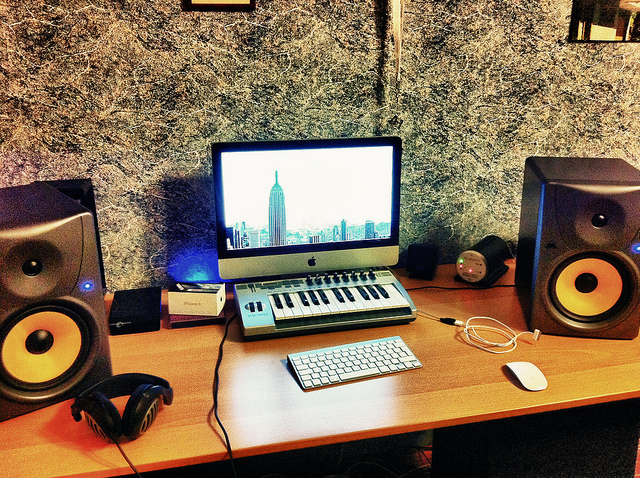Almost everyone would agree that finding a regular flow of VO jobs can be challenging at times. You need to have the connections. If not, you need to research a lot online. But, researching online does not guarantee you have a steady flow of paid recordings. Everytime you have to submit demo reels that means that you have to record with industry-standard audio quality, so you hire a sound studio and pay for the recording. Of course besides the money you invest quite some time in the process.
Then you submit the samples to an agent or advertising company and wait for a long time till the recording is accepted and really used to promote your voicing service. You’ve dedicated a lot of time trying to get the sample recorded and on top of that you need to find potential clients and / or an effective agent to get you jobs. This is a time-consuming process that you can shorten if you do most of that promotion job at home. For that you need an effective online presence and above all a home studio.
Home studios are simply recording studios that are set up in one’s house. They are intended for those who would prefer managing themselves not just the process of recording samples, but first and foremost can perform the task of actually recording the script from the client. For potential employers like advertising agencies you will be in a good position, you will offer more value: it’s your voice, plus the recording and certainly editing and cleaning the recording. The chances of landing a job would be much higher.
Having a home studio has a set of advantages and disadvantages. But, in this blog, we will be discussing the basics of setting up a home studio. And, by basic, we mean the necessary things you need to have and do to start it. So how to build a home studio?
In an interview with Bill DeWees, he shares some ideas and tips on creating a home studio:
“First and foremost is a quite space! That is really the biggest studio challenge for the “at home” voice talent (which most of us are). Contending with kids, the TV, traffic noise, and low flying airplanes is a daily challenge. If you have the greatest gear and a noisy recording space, you’re sunk before you start. For the first few years I operated out of the master bedroom closet. My wife allowed me (and even helped me) drill holes in the wall so I could operate the PC from an adjacent room to eliminate the computer fan noise. Since then I’ve graduate to a Whisper Room recording booth. It’s not 100% sound proof but it sure goes a long way in isolating noise.
“The next big thing is the microphone. Your mic is what will determine the ultimate quality of recording more than any piece of gear. It also becomes a marketing tool as many of the studios that you work with ask what your equipment is before they will agree to work with you. I always counsel talent to be sure to take no shortcuts in recording their commercial demo and buying a good microphone.
“After that is a matter of having a good pre-amp and adequate recording/editing software. There are lots of recording software programs on the market. Get what works best for you needs (for me, simpler is better!)”
So, to summarize, here are the most important things you need to have:
- A quiet working area
- A good microphone
- A nice recording/editing software
Microphones for voice artists are like ice cream for children. They all are made from almost the same components but everyone prefers a certain flavor. There is no uniform type or brand of microphone that works for everyone. Each one of us can have one depending on our preference and the conditions that affect the quality of microphones.
A Squidoo Lens from JaShinYa lists some suggestions on microphones you can use for your own home studio:
- Audio-Technica AT2020
- Rode M3
- AKG Perception 120
- Blue Yeti USB Microphone
- MXL 990 Ribbon Microphone
There are also many awesome recording and editing softwares available online. Some of them are free while some are paid. Among your choices would be Audacity, WavePad, Adobe Audition, Mixcraft, Sound Booth, and a lot more.
Now, you. What are the advantages of a home studio? Do you think employers appreciate that and pay that extra value you provide with a home studio? Do you have any suggestion on what equipment to use for a home studio? Comment below!
